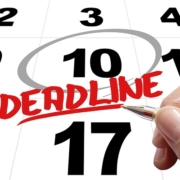Marketing, and in particular content writing, always seems like an unpredictable path. Customer’s change their minds, people go on holidays, unexpected additions creep in; and before you know it you’re a month past due and people are screaming.
It’s not like you’re slacking off, so why are people so upset?
I like to think of this as the project horizon, where most people are focused on the end point rather than the steps it takes to get there. As marketing professionals, it falls to us to be project guides as much as writers; building a delivery plan, creating expectations and managing each change as it occurs. It comes across like covering your butt more than project management, but it’s necessary.
The first real step in the process is controlling expectations.
DON’T RELY ON PROJECT DATES, SET MILESTONE DATES
Everybody wants to set a completion date, it’s the nature of services work regardless of your profession. Having a date penciled in is important, but it shouldn’t be the driving force for timelines. Rather, construct a system of stage-gates that reflect the major deliverables in your content writing. This not only separates responsibilities from you and the client, but it enables you to manage expectations on deliverables.
For content writing, I have several major stages that take place before I can say the final copy is completed. These are the most common steps I take with my customers when doing copywriting and hypothetical timelines.
Week 1: Client interview and research
Week 2: Tone draft
Week 3: Tone review with customer
Week 4: Draft 1 writing
Week 5: Draft 1 review with customer
Week 6/7: Draft 2
Week 8: Draft 2 review with customer
Week 8: Finalized copy proofing and launch
Total Time Estimate: 2 months across 8 major stages
ACCOUNT FOR DELAYS
The project might be penciled in for two months, but more importantly, each step has a delivery expectation. For example, the tone draft may take a week to do and you may give the client a week to review it. You should be able to meet your deadlines as a content professional, but if the client misses their expectation, it has to be accounted for. A one week delay turns a two month project into a two month and one week project.
I can’t tell you how many times a customer got angry at project delays they were responsible for, and without documentation and communication, you can’t sit there and yell back at them. Well, you can, but you probably won’t be in business long. Keeping a simple spreadsheet of estimated timelines, stage-gates and delays will make sure everything is in check.
About the author: Sean Kopen

With a unique, story-based approach to writing, Sean Kopen is an experienced content marketing specialist and instructional designer. Review some of his personal stories and perspectives at his website www.seankopen.com




Don’t start your copywriting lecture with an apostrophe error in the first word of the second sentence.
Good point about milestone deadlines. That should keep both yourself and the client honest and productive.
One tip I read in Peter Bowerman’s ‘Well-Fed Writer’ was to bill extra when the client changes project direction, or adds new objectives not agreed to in the original contract. Either they play nice, or they pay extra; either way works! :)